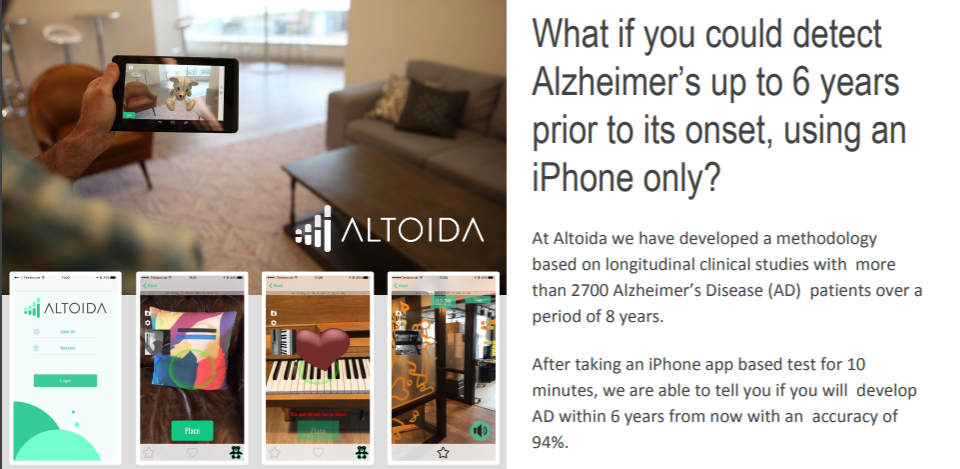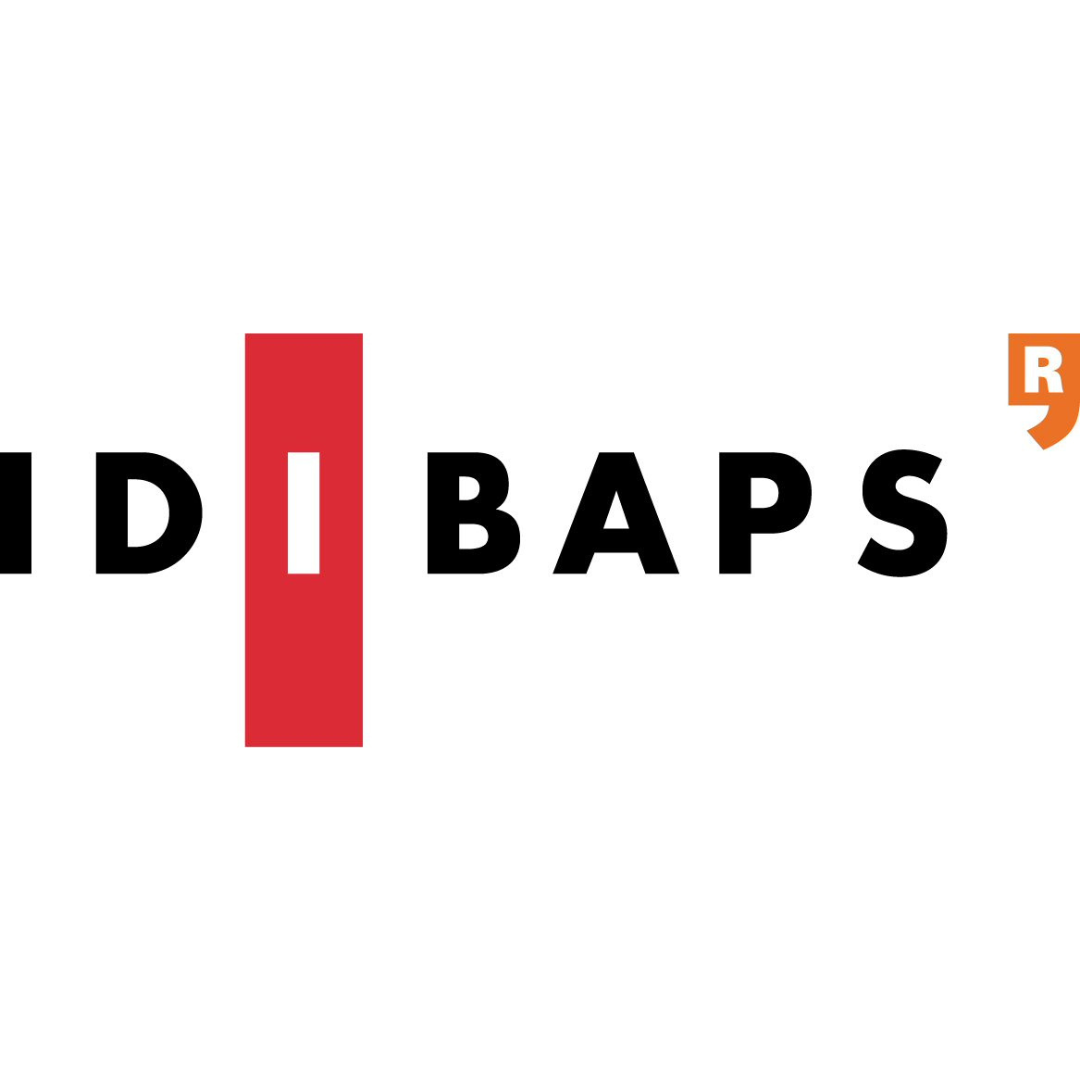Alzheimer's disease prediction service
The Alzheimer’s Disease Prediction Service (ADPS) employs an easy smartphone test to predict whether someone is likely to develop Alzheimer’s in the next six years, using data that has shown 94% accuracy. It will be one of the first validated solutions to enter the EU market as a pre-symptomatic biomarker to predict Alzheimer’s risk for people over 50.
Origins
Current diagnostic measures of Alzheimer’s Disease are invasive, expensive and time-consuming, and thus have limited use as frontline screening tools. Although experts realise the potential of screening with virtual reality, augmented reality or activity tracking technologies, routine examination is only carried out after symptoms appear and brain damage is already done. Early screening enables prevention and could dramatically reduce future costs of dementia care.

Team
ADPS unites leading academic and industry partners with a focus on computational dementia diagnosis. It involves memory clinics specialsed in data on pre-symptomatic patients – in Dublin, Barcelona, Zurich, Lausanne and Amsterdam. Altoida AG, the business champion for this project, was spun off from ETH Zurich and founded in 2016 by Ioannis Tarnanas (PhD Neuroscience), Max Buegler (PhD Machine Learning) and Richard Fischer (healthcare entrepreneur).
The project
ADPS develops and markets a solution with a 10-minute smartphone-based test that can predict Alzheimer’s Disease before patients even show symptoms. This project builds on the team’s previous datasets, which include more than 3 500 patients and have shown 87-94% diagnostic accuracy in predicting Alzheimer’s up to six years in advance.
ADPS has a long scientific history: in 2000 it became the first solution in the world to assess cognition using virtual reality. The solution now uses augmented reality and is already deployed to neurologists and primary care physicians as a cognitive assessment tool for patients.
It is also distributed to global biopharmaceutical companies, to assist with the discovery of novel treatments for Alzheimer’s. The objective of this Innovation Project is to further evaluate the accuracy and performance of the ADPS prototype – which continuously tracks everyday cognition and combines different mobile phone activity data layers using machine learning techniques.
Compared to the more invasive, expensive Alzheimer’s tests that are currently used, ADPS will be more scalable and more independent of human error during the analysis.
Impact
According to a 2014 Alzheimer report, only 35% of dementia cases are diagnosed early enough. Predicting Alzheimer’s disease before brain damage is done makes it possible to use better preventive treatment, and patients’ lives can be greatly improved, while social costs are reduced. If this solution is applied today, it could save an estimated €500 billion by 2050 in annual dementia costs.
Why this is an EIT Health project
In keeping with a key EIT Health goal, this project promotes active ageing. It is also in line with these EIT Health focus areas:
- “Care Pathways”, by facilitating an earlier start to care.
- “Real World Data”, by using patient records to define its markers for Alzheimers.
- “Bringing Care Home”, by providing a test, and exercises, that patients can do on their smartphone.
Members

CLC/InnoStars: Spain
Partner classification: Research
Partner type: Linked/Affiliated Party
The Fundació de Recerca Clínic Barcelona-Institut d’Investigacions Biomèdiques August Pi i Sunyer (IDIBAPS) is a public research centre dedicated to biomedical research, founded in 1996 to broaden the clinical research of the Hospital Clinic de Barcelona (HCB). With >1,500 original articles and >2,500 publications annually, IDIBAPS is one of the leading biomedical research centres in Spain driving forward original multidisciplinary biomedical research on multiple diseases affecting our society, with the mission to translate “knowledge into cure”. The broad vision of IDIBAPS Strategic Plan is to improve the health and quality of life of citizens through high impact research and collaborations, at the highest level of scientific integrity, public accountability, and social responsibility. The close interaction of 100 clinical and laboratory research groups, composed by more than 460 Principal Investigators, drives forward original translational and multidisciplinary research oriented to solve relevant biological and clinical questions for human health. The researchers have access to novel and first-class infrastructures available together with six own core facilities offering a wide range of services under strict quality management controls performed at all levels. The institution has also a strong track record working in European projects (e.g. 90 projects obtained along H2020 and 36 in Horizon Europe) and has a dedicated European Projects Office (OPE) and the Knowledge and Technology Transfer Office (KTT).
Fundació de Recerca Clínic Barcelona-Institut d’Investigacions Biomèdiques August Pi i Sunyer (IDIBAPS)
Carrer del Rosselló, 149, 08036 Barcelona, Spain
Key Activities in Research and Developement
1600 researchers in 100 research groups
Key Activities in Corporate Innovation
Key Innovation capacities
-Strong expertise in EIT Health projects (involved in +30 projects from all pillars since 2016)
-Internationally recognized KOLs in different fields (+100 management positions in international scientific and clinical societies)
-High volume of Clinical Trials (+200 new clinical trials performed every year) with a dedicated Clinical Trial Unit, offering an integral support
-Technology transfer (12 active spin-off; +70 active patent families)
Key Activities in Business Creation
Testing & Validation
Key Activities in Education
Medical faculties, Healthcare professional education/training


CLC/InnoStars: UK-Ireland
Partner classification: Education, Research
Trinity College Dublin is Ireland's leading University and has a number of activities relevant for EIT Health: School of Nursing & Midwifery, with a focus on Ageing & Intellectual Disability, Mental Health, Population & Community Health and Improving Health & Wellbeing of Women, Children & Families; Trinity Centre for Practice & Healthcare Innovation; Bioengineering & Advanced Materials: Trinity College Institute for Neuroscience & Global Brain Health Institute; TILDA - Irish longitudinal ageing study; School of Computer Sciences & Statistics with expertise in AI, digital content technology, augmented reality and statistics & data science; Learnovate: Innovation in EdTech and learning technology; ADAPT: Digital content and media innovation; Tangent, Trinity's Ideas Workspace: innovation and entrepreneurship education and start-up support; Trinity Business School Centre for Social Innovation; Science Gallery.
Trinity College Dublin
Trinity College Dublin, College Green, Dublin, Ireland
Key Activities in Research and Developement
Other research, Biomedical engineering, Life Sciences, Clinical research
Key Activities in Corporate Innovation
Med Tech, ICT
Key Activities in Social Innovation
Healthcare provision
Key Activities in Business Creation
incubation, Technology Transfer, Business coaching
Key Activities in Education
Business Schools, Entrepreneurship training, Technical faculties, Medical faculties, Healthcare professional education/training


CLC/InnoStars: Spain
Partner classification: Academic, Education, Research
The University of Barcelona is the most intensive university in research in Spain. Our university has a great capacity for innovation in various fields, of which the health sector stands out both due to the amount and the quality of the outcomes produced by faculties such as the Faculty of Medicine and Health Sciences, the Faculty of Pharmacy and Nutrition or the Faculty of Psychology. Our activity within the EIT Health projects is often enriched and sometimes dominated by the technology and/or knowledge created in the Faculties of Biology, Chemistry, Physics, Mathematics and Computer Science or even Fine Arts. We have also several Research Institutes that merge multidisciplinary teams working on topics as diverse as Neuroscience, Complex systems, Biomedicine, etc. as well as a couple of Technology Transfer Institutes such as CREATIO https://www.ub.edu/creatio/en/, the first Academic Center for the Production and Validation of Advanced Therapies in Spain, and Farmatec http://www.ub.edu/sdm/in_index.htm, a Service of Development of Medicines under GMP regulation
University of Barcelona
University of Barcelona, Gran Via de les Corts Catalanes, 585, 08007 Barcelona, España
Key Activities in Research and Developement
https://web.ub.edu/en/research
Key Activities in Corporate Innovation
https://web.ub.edu/en/the-university
Key Activities in Business Creation
https://startub.ub.edu/en/community/incubated-companies/
Key Activities in Education
https://web.ub.edu/en/learn
